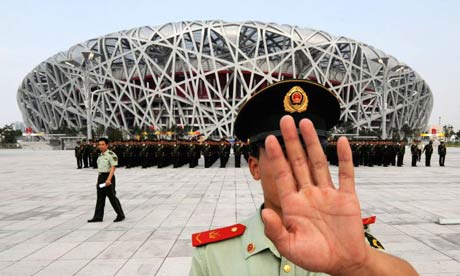AFP, 26 Jan 2008-
DAVOS, Switzerland (AFP) — Serious concerns were raised in Davos last week about the ability of the Chinese government to spy on the country’s 500 million mobile phone users.
The head of China’s biggest mobile phone company, which has more than 300 million subscribers, stunned delegates by revealing that the company had unlimited access to the personal data of its customers and handed it over to Chinese security officials when demanded.
The admission, described as “bone-chilling” by US Congressman Ed Markey, sent shivers through an audience of telecom experts at the World Economic Forum who immediately saw the potential for misuse and surveillance.
“We know who you are, but also where you are,” said the CEO of China Mobile Communications Corporation, Wang Jianzhou, whose company adds six million new customers to its network each month and is already the biggest mobile group in the world by users.
He was explaining how the company could use the personal data of its customers to sell advertising and services to them based on knowledge of where they were and what they were doing.
When pressed about the privacy and security implications of this, he added: “We can access the information and see where someone is, but we never give this information away … only if the security authorities ask for it.”
The movement of mobile phone users can be tracked because they connect to local base stations, giving a trail that can only be accessed in most democratic countries by security officials under strict conditions.
Mobile phones can also be easily tapped.
Markey, who is chairman of the US House of Representatives subcommittee on telecommunications, contrasted the situation with the checks and controls in place in the United States, where a court order is required for the government to check phone records.
“I have my eyebrows arched so high they’re hitting the ceiling,” he told AFP after listening to Wang.
“I have many, many more questions about what the relationship is with the government and moreover how the company can use that information.”
US Internet company Yahoo was widely pilloried and faced a congressional hearing after the group divulged information to Beijing police that landed a Chinese journalist in jail.
Shi Tao was convicted in 2005 of divulging state secrets after he posted a Chinese government order forbidding media organisations from marking the anniversary of the Tiananmen Square uprising on the Internet.
He was identified with information provided by Yahoo and was sentenced to 10 years in jail.
Jonathan Zittrain, a professor of Internet governance and regulation at Oxford University in Britain, stressed how the mobile phone had become a serious threat to privacy in all countries.
“It’s amazing to see how such a comprehensive surveillance network has been set up through the market force of consumer demand,” he told AFP.
“With CCTV (closed circuit television), the government sets it up and you have nothing to say about it. With this (mobile phones), you’re paying for your own monitoring device.”
He said governments in democratic countries were “just waking up to the need for regulation.”
The remarks by Wang came in the context of a discussion about how mobile phone operators could generate additional revenues by increasing targeted advertising and other services.
The idea of location-based advertising, in which advertisers use the location of mobile phone user to send targeted advertising, also won support from Google chairman Eric Schmidt.
He used the example of how an advertiser of fast-food could target a user with advertising when he or she was near a restaurant.
Wang said his company was able to estimate the number of people at last year’s Shanghai Formula One grand prix by counting subscribers in the area.
When enough people had phones in China, the data could be used to estimate the number of people on roads at a particular time as a proxy for the level of congestion, he said.
The number of mobile phone users in China was 523.3 million at the end of September, up 13.5 percent from the end of 2006, according to official data.
The discussion took place in a session titled: “The Future of Mobile Technology.”
– Original report from AFP : China’s mobile network: a big brother surveillance tool?





